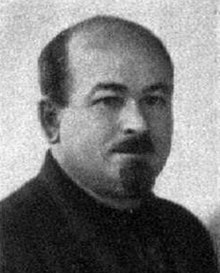Paul Jäkel
Paul Jäkel (born April 7, 1890 in Kleinhelmsdorf near Liegnitz , † February 12, 1943 near Michurinsk ) was a German politician ( KPD ) and trade unionist ( RGO ).
Live and act
Jäkel, the son of a homeworker family , attended elementary school in Chemnitz from 1896 to 1904 . He then learned the mason trade by 1908 . After that he worked in his profession. In 1908 Jäkel joined the Social Democratic Party of Germany (SPD). From 1912 to 1918 Jäkel did military service and took part in the First World War. Jäkel was a member of the Navy with the coastal artillery in Belgium . At the beginning of November 1918 he was a member of the Workers 'and Soldiers' Council in Belgium.
At the end of November 1918 Jäkel returned to Chemnitz, where he joined the Independent Social Democratic Party of Germany (USPD). In 1919 he joined the Communist Party of Germany (KPD). After the war he worked as a bricklayer again in Dresden . In 1921 he became a full-time functionary in the trade union, then in the KPD. In 1920 he was elected second chairman of the association of excluded construction workers in Chemnitz. At the end of 1922, Jäkel took part as a delegate at the II Congress of the Red Trade Union International (RGI) in Moscow . After the association of excluded construction workers had been dissolved and its members returned to the free trade unions, Jäkel became head of the KPD trade union department and member of the secretariat of the Erzgebirge-Vogtland district management in 1924. In the spring of 1930 Jäkel became head of the newly formed district leadership of Saxony of the Revolutionary Trade Union Opposition (RGO) in Leipzig and a member of the district leadership of Saxony of the KPD. In February 1931 he became secretary for trade union issues in the Saxony district leadership of the KPD. In 1932 the Central Committee sent him to Berlin, where he held a leading position in the RGO. From November 1932 to March 1933 Paul Jäkel was a member of the Reichstag for his party as a member of the constituency 29 (Leipzig) .
After the " seizure of power " by the National Socialists, Jäkel initially remained head of the RGO in Saxony, then emigrated to Czechoslovakia in July 1933 , where he headed the border work of the RGO under the code name Jan Dietrich . In January 1934 Jäkel went to the Soviet Union and worked as a secretary at the RGI until 1937 and then in the German section of the Comintern . In October 1941 Jäkel was evacuated to Ufa and was there responsible for looking after emigrants. He also worked as a political instructor among German prisoners of war . Jäkel died of typhus on February 12, 1943 in a prisoner-of-war camp in Michurinsk .
Honors
Today, among other things, Paul-Jäkel-Strasse in Chemnitz is a reminder of Jäkel's life and political activities.
literature
- Jäkel, Paul . In: Hermann Weber , Andreas Herbst : German Communists. Biographical Handbook 1918 to 1945 . 2nd, revised and greatly expanded edition. Karl Dietz, Berlin 2008, ISBN 978-3-320-02130-6 .
Web links
- Paul Jäkel in the database of members of the Reichstag
| personal data | |
|---|---|
| SURNAME | Jäkel, Paul |
| BRIEF DESCRIPTION | German workers (bricklayers) and politicians (KPD), MdR |
| DATE OF BIRTH | April 7, 1890 |
| PLACE OF BIRTH | Kleinhelmsdorf |
| DATE OF DEATH | February 12, 1943 |
| Place of death | at Michurinsk |
